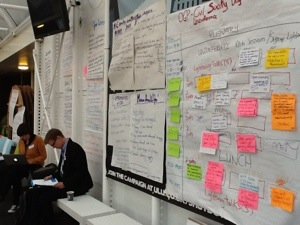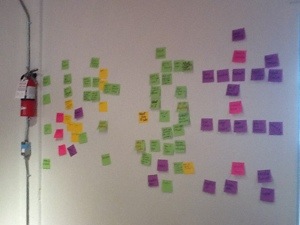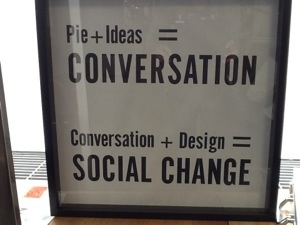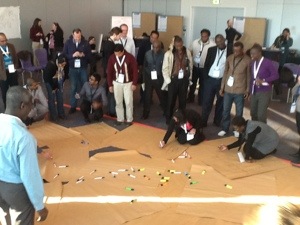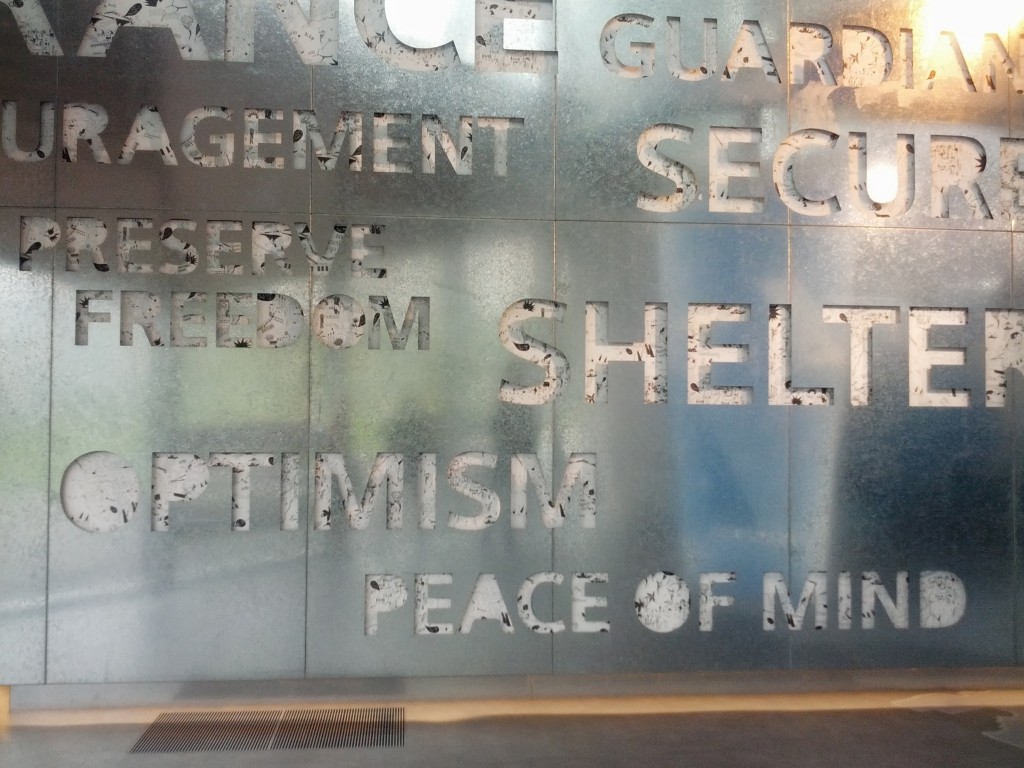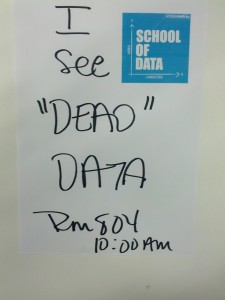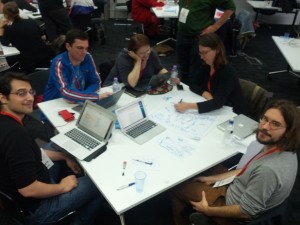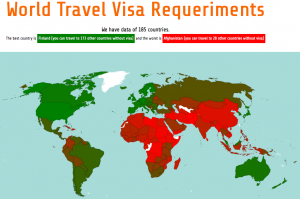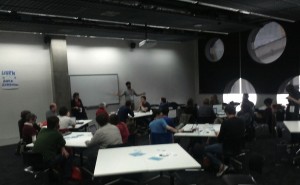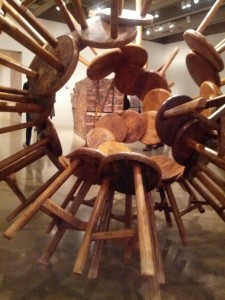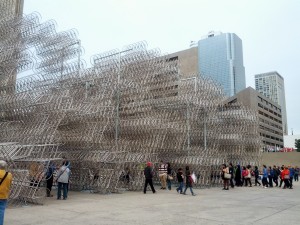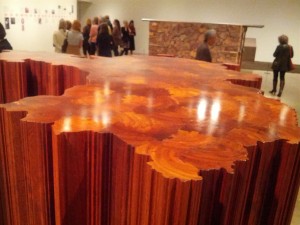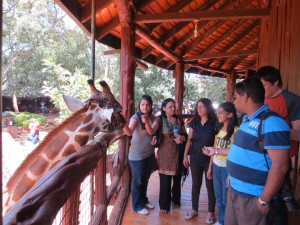Here we are again. It is the day before a mass of hackathons occur around the world. It is exciting and important. Really. We all dream of using our knowledge and technical skills for a cause.
Earlier in the week I mentioned that we need to get more organized as a global community. Inspired by my colleague, John Crowley who wrote in Time Ideas: “Stop Catastrophizing Relief Efforts in the Philippines“, I ask that we please “Stop Hacking without Specing”. (Spec’ing = build a specification = a plan)
In the past week, I have had no fewer than 30 conversations with individuals, groups, governments and fellow organizers all about How to Help. They have been so amazing in their earnest need to include the technical community. We have come along way. Folks are asking tons of questions to prepare for the weekend. This is fantastic. I am so impressed with their fresh eyes, warm response and desire to make a difference.
I have two points to make: Organizers need to get connected/organized and we, collectively, need a TOP 10.
So you want to Hack for Emergency Software for change
Welcome, we are so excited for you to join us. Sorry that we have not got this quite sorted yet. This is new ground. We are all trying to build a common language. This is my short list of considerations:
Steps:
1. DO YOUR HOMEWORK
Please don’t hack or organize a hackathon without looking into what was done previously. Yes, of course, if you have a brand new idea: great! But first, check the following;
a. Random Hacks of Kindness website
b. Github
c. Google foo (trust me, it sometimes works)
2. ASK THE GLOBAL COMMUNITY
d. ASK our community – ask Geeks without Bounds, ask Random Hacks of Kindness, ask Crisis Commons and ask Crisismappers. We apologize in advance that we have not organized this yet. Trust me, we know this is an issue. Join us and help make it better. We have community skype windows open, just add me and I’ll introduce you – username- heatherleson
3. OPEN SOURCE IS LOVE, BUILD ON EXISTING SOFTWARE
We don’t need another Ushahidi, Sahana, SMSSync, Person Finder, etc.
(more on this below)
4. IF SOMETHING NEW, DOES it have an OWNER
…(And, will the owner be at your event) Serving an audience and having an owner be part of the design, testing and implementation process equals better software.
5. CHUNKS, DON’T TRY TO HACK THE OCEAN
Bring the problem down to hackathon size. The hackathon leaders need to really think about the problem statement and what is actually feasible to build or build-on during a weekend.
6. KEEP THE TECHS WANTING MORE
People are using their weekend to DO something. Every interaction is a gift. Honest. But, we want to build trust and have them know that their small contribution matters in the bigger picture. This is a really hard one. Honest. We know. Help everyone feel like they are part of the second or third wave of a very long process to build this collective effort.
7. IS IT SUSTAINABLE, USABLE
Who are you really serving if you build the shiniest tool that cannot be used in the field? Infuse your hack with local knowledge. Do they really have a need for an HTML5 enabled phone app when there is no CELL PHONE COVERAGE? Can you write a feature phone (DUMB PHONE) app?
8. Emergency Hack Lab
Emergency Hack Lab tackled the question of how to credential, task and thank volunteers in times of crisis. We hacked and built proto-workflow for the UN OCHA Noun Project sets to the Mozilla Open Badges programme. More details from session organizer Jessica Klein. You can add to this.
9. MAP instead?
Why not contribute to OpenStreetMap? The community has been mapping all week. Join the Humanitarian OpenStreetMap team and add to the map. Why is this important? UN OCHA, Red Cross and Doctors without Borders are already using it in the field and to inform their decisions. If you want to have an impact, map it!
Ok, that is part 1 – Helping the Hackathons in the interim. Yes, it is only 9 items. Please feel free to add something in the comments as I have probably missed one or 2.
***********
What is our top 10 Hacks that we need in Crisis/Emergency response
We are here again. How can we make sure that new hackathons, new techs learn from our experiences and build on efforts that already exist? I think that we have to have a TOP 10 wishlist that we know needs to happen.
I call on my fellow global community leaders to review and improve these. AND, I promise to make this a session at the International Conference of Crisismappers next week. I am sad that we are here again, but we deserve it. We need to get more organized and help the hackathon surge folks know what we need. Yes, we are still trying to figure it out, however, we have got to get better organized.
1. Humanitarian Exchange Language
NGOs and Governments need to share information better. UN OCHA is building this to help improve flow. This hack has been part of RHOK, International Space Apps Challenge and others. The code is online.
2. Google Person Finder
Ka-Ping Yee has worked tireless to document Google Person Finder. It has been deployed numerous times in the field and has been reviewed by many people in the humanitarian field. Help improve it.
3. Ushahidi
Bias alert: I am an Ushahidi former staffer and permanent fan girl. This has been deployed many times in the field. There are bugs. And, they have a new version. I believe that if we put our heads together with techs that we could make is so much better. This means that Ushahidi has to meet us half way (What are the top 10 hacks that people can do to help?) We need to see the power of citizen voices and how this project could help amplify real needs. Ushahidi can help on this. But, it needs community support. (love you guys)
4. Micromappers, Crowdcrafting, SwiftRiver and Tweek the Tweet
All of these tools work on helping people manage signal to noise. The help volunteers get engaged and curate mass volumes of information. How can the technical community help?
http://micromappers.wordpress.com/
http://dev.pybossa.com/
https://github.com/ushahidi (swiftriver)
http://faculty.washington.edu/kstarbi/tweak-the-tweet.html
5. ALL YOUR DATA SETS BELONG TOO….
Last night I handed a population of Philippines dataset to Medicine Sans Frontieres. Some friends had scraped it from Philippine National Statistics website (http://www.nscb.gov.ph/activestats/). Not sure on the license, but folks need to have data with an open license to be able to layer it to maps. Why don’t we have a package of all the top datasets ready by country for emergency response?
6. MAPS ARE LOVE
We need common sharing among all the various map projects. And, a standard that lists all the active maps and provides interoperable layers so that people can pick and choose. When I say people, I mean those in the field who are helping.
Truly, we all dream of satellite imagery, citizen data, open data and sensor data on one map. Maps are love. What can we do to make this happen?
I am purposely leaving the remaining 4 items empty. What is on your list?
…..Happy hacking! Really, I am so very excited to see techs using skills to help. Just be aware, you may get hooked and change your life like I did.
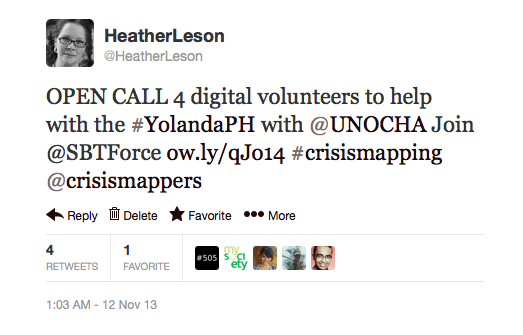
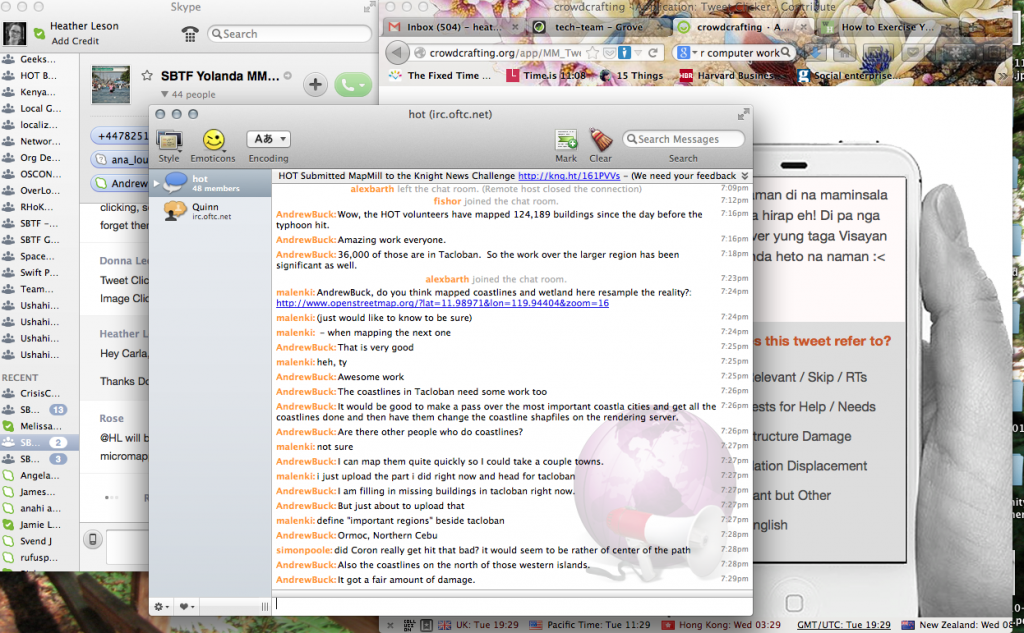
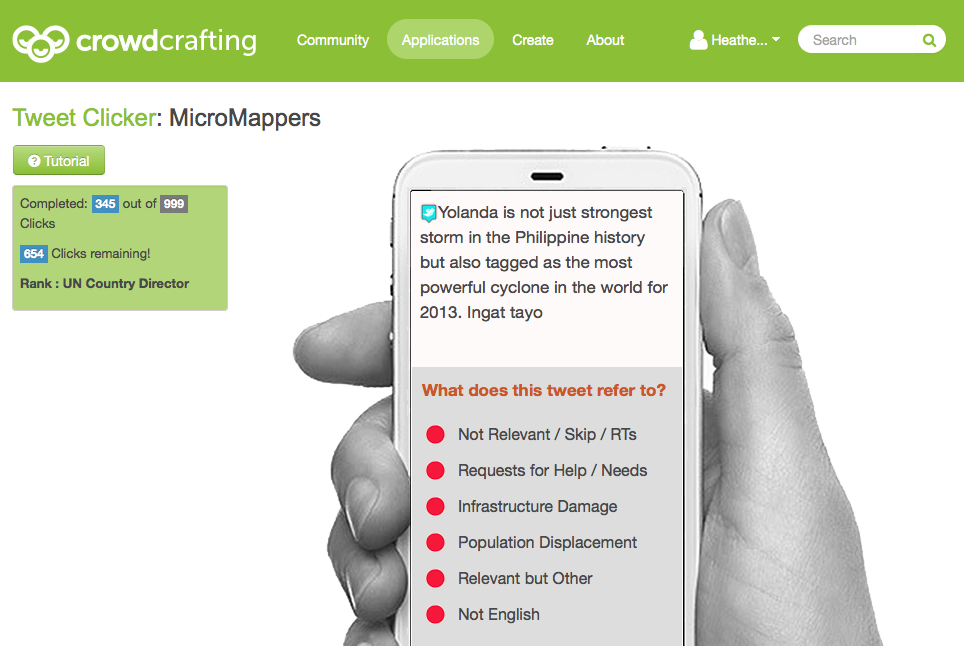
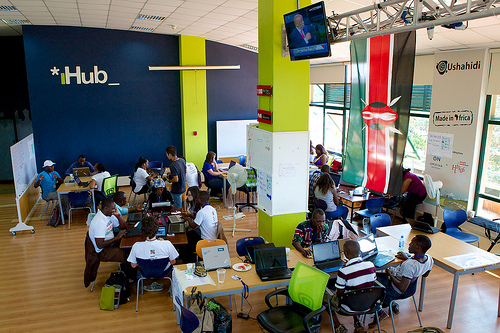 (Photo by Ushahidi)
(Photo by Ushahidi)